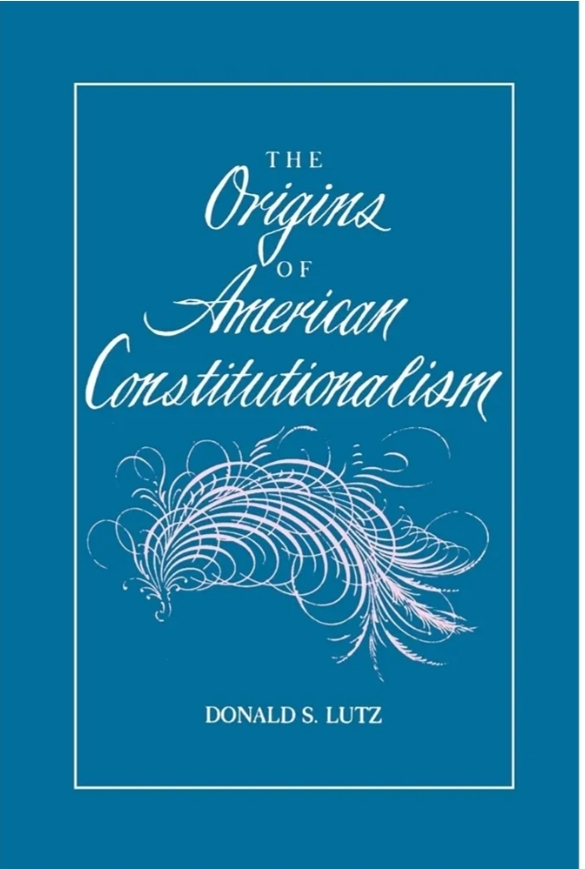Donald S. Lutz’s The Origins of American Constitutionalism provides an in-depth analysis of the historical and intellectual roots of the U.S. Constitution. Lutz, a political scientist and constitutional scholar, explores the evolution of constitutionalism in America from its colonial foundations to the drafting of the U.S. Constitution. This work is part of the Bibliographies in the History of series and is often praised for its scholarly depth and accessible writing.
Main Themes and Concepts:
Colonial Origins of American Constitutionalism: Lutz argues that the principles of American constitutionalism did not emerge solely from the debates during the Constitutional Convention but have deep colonial roots. He traces these roots to the political practices and documents of the early American colonies, where settlers developed local systems of self-governance and constitutional principles. Key influences include colonial charters, compacts, and early state constitutions, all of which contributed to the development of American political thought.
Covenants and Compacts: A key element in Lutz’s work is his examination of covenants and compacts as fundamental building blocks of American constitutionalism. He explores the influence of religious covenants, particularly from Puritan communities, and how these early agreements informed the notion of a social contract. Covenants emphasized the idea of mutual consent and governance by agreement, laying the foundation for the later development of written constitutions.
Constitutionalism as an Evolving Tradition: Lutz presents American constitutionalism as an evolving tradition, shaped by the practical experiences of self-governance and the need to balance individual liberty with the common good. He delves into how colonial experiences, including the drafting of early state constitutions, contributed to a broader understanding of constitutional government.
Influence of European Political Thought: Lutz also explores the influence of European political thought on American constitutionalism, particularly the works of philosophers like John Locke, Montesquieu, and Algernon Sidney. These thinkers introduced ideas about natural rights, separation of powers, and the rule of law, all of which were instrumental in shaping American political thought leading up to the Revolution and the creation of the U.S. Constitution.
The Revolutionary Era and the U.S. Constitution: The book traces the intellectual and political developments of the Revolutionary era, focusing on how the experience of resisting British rule and asserting independence contributed to the formation of a distinctly American constitutional identity. Lutz highlights key documents, such as the Declaration of Independence and the Articles of Confederation, that helped bridge the transition from colonial governance to a new, unified constitutional framework.
The Writing and Ratification of the Constitution: Lutz’s study culminates in an analysis of the Constitutional Convention of 1787 and the subsequent debates over ratification. He argues that the U.S. Constitution was the product of a long process of political evolution, drawing on both the practical experiences of the colonies and the theoretical contributions of political philosophers.
American Constitutionalism in Comparative Perspective: One of the strengths of Lutz’s work is its comparative approach. He contrasts American constitutionalism with its European counterparts, showing how the U.S. developed a unique form of government based on principles of federalism, separation of powers, and popular sovereignty. Lutz argues that this distinctiveness is due, in part, to the specific political and social conditions of the American colonies.
Structure of the Book:
Introduction: Lutz sets the stage by discussing the importance of understanding the origins of American constitutionalism in order to fully grasp the meaning of the U.S. Constitution.
Early Colonial Foundations: This section explores the political systems of the early American colonies and how they laid the groundwork for later constitutional developments.
Covenant and Compact Theory: Lutz delves into the religious and political covenants that shaped early American political thought.
European Influences: The book discusses the impact of Enlightenment thinkers on American constitutionalism.
The Revolutionary Period: Lutz examines how the American Revolution and the subsequent struggle to form a new government contributed to constitutional development.
The U.S. Constitution: The final chapters focus on the drafting, debate, and ratification of the U.S. Constitution.
Significance and Reception:
Lutz’s work is considered a significant contribution to the study of American political thought and constitutional history. By placing American constitutionalism in a broader historical and intellectual context, he provides readers with a deeper understanding of the origins and evolution of the principles that continue to shape American government today.
Scholars and students of political science, law, and history frequently use this book as a foundational text to understand the intellectual heritage of the U.S. Constitution and the factors that influenced its creation.
Conclusion:
Donald S. Lutz’s The Origins of American Constitutionalism offers a thorough exploration of how the U.S. Constitution emerged from a blend of colonial experience, Enlightenment philosophy, and revolutionary fervor. By examining the long history of American constitutional thought, Lutz illuminates the deep and complex roots of American governance, making this book an essential resource for anyone seeking to understand the foundations of American constitutionalism.







